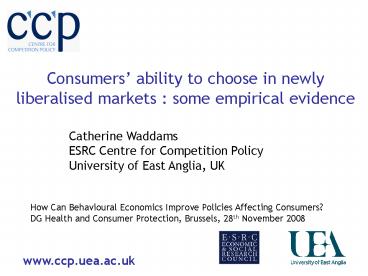Consumers - PowerPoint PPT Presentation
1 / 19
Title:
Consumers
Description:
How Can Behavioural Economics Improve Policies Affecting Consumers? DG Health and Consumer Protection, Brussels, 28th ... Owning own house better than rented ... – PowerPoint PPT presentation
Number of Views:9
Avg rating:3.0/5.0
Title: Consumers
1
Consumers ability to choose in newly liberalised
markets some empirical evidence
Catherine Waddams ESRC Centre for Competition
Policy University of East Anglia, UK
How Can Behavioural Economics Improve Policies
Affecting Consumers? DG Health and Consumer
Protection, Brussels, 28th November 2008
2
Consumers ability to choose in newly liberalised
markets
- How far have consumers exercised their choice?
- Are they motivated by rational considerations?
- How well do consumers switch, based on their own
estimates of expenditure (consumption)? - Do consumers know their own expenditure?
- Is there enough switching?
- Has there been consumer overload?
3
Switching in different markets, 2006
From Special Eurobarometer 260, 2007
4
Are consumers rational?
- Survey of 2027 adults in GB, 2005, for eight
utilities and - financial products not experiment, dependent on
recall - Did they
- Have a choice of suppliers in their region?
aware - Had they searched around for better deals
searched - Switched supplier in last three years switched
- usual households characteristics age, gender,
education - (high income refusal)
5
Awareness, searching, switching
6
What were the expected benefits and costs?
- Potential Benefit How much is the most you
think you could save per month if you shopped
around? - Search cost How much time do you think it would
take you to search around to find the best deal?
- Switching cost How long do you think it would
take of your own time to switch once you had all
the necessary information? - Note included any financial switching costs all
based on consumers own estimates
7
Expected gains and costs of search/switching in
each market
8
Were they rational?
- Yes.
- Searching and switching more likely if expected
gain was higher (weaker than using actual
potential gain, indicating importance of
advertising) and - less likely if expected time to switch and search
was higher - Expected switching time a greater deterrent than
expected search time an extra hour of time
needed to switch had three times the deterrent
effect of an extra hour needed for search - .. but
9
Other factors also important
- Most important whether had switched in other (of
our) markets, particularly for men and those with
more education - Age familiar U-shape young and old more likely
to switch - Education/income increased likelihood of
switching - Interpret as confidence individuals variance
around central estimates of gain and pain may be
as important as central estimates themselves
10
Do consumers who switch choose well? Evidence
from the electricity market
- Used consumers estimate of expenditure (so no
error from not knowing consumption), old and new
suppliers and our own knowledge of tariffs - Calculated the change in expenditure from old to
new supplier for consumers who switched only to
save money - Plotted gain made against choosing the best deal
for that consumer - Tested for sensitivity to changing demand,
different timing of switching
11
Actual Gains Made versus Maximum Gains Available
12
How well did the switchers do?
- Less than a fifth selected cheapest supplier
- Switchers gained less than half of maximum
available. - Consistent with rational decisions and search
costs - BUT
- At least a fifth chose a more expensive supplier,
losing an average 14-35 per year, excluding
switching costs - No evidence of learning from errors (2005 no
better than 2000 second switching no better than
first) - Consistent with Ofgem finding (2008) 17 active
half rest will switch in response to direct
marketing, often poorly - Suggests some confusion/consumer overload
13
Who did best?
- U-shaped age curve young and old did better than
middle aged - Owning own house better than rented
- Experience of switching gas supplier had a
detrimental effect, so no evidence of learning
from related markets in terms of quality of
decision - No explicit income/social class/education effect
14
Consumer vs company estimates of electricity
expenditure
15
Comparison with supplier data
- Compared consumer estimates of expenditure on gas
and electricity with supplier records - 1113 consumers and 12 energy companies in 2000
- Consumers tended to think they spent the average
amount - low users overestimated expenditure
- high users underestimated
- Errors bore no (other) relation with income,
social grade, age, tenancy
16
Has there been enough switching?
- To discipline markets?
- Evidence from UK energy remaining incumbent
mark-ups from old monopolists 10 (reduced to 6
during recent regulatory inquiry) - If lack of rivalry all prices raised, switching
ineffective - From consumer perspective
- Unknown search/switching costs make assessment
difficult - Increased confidence would have same effect as
lower search/switching costs
17
Evidence of consumer overload?
Yes from any underswitching (so incumbents
benefit from endowment effect) consumer errors
and direct questions.......
18
Policy Implications
- To increase switching
- Raise expectations of gains (supplier
advertising) - Lower perceptions of costs, especially switching
costs - Increase consumer confidence
- Explore role of branding in consumer loyalty
- Exploit externalities across markets to increase
confidence, so work on the next group likely to
switch to leverage discipline - Explore annual reminders, format of billing
information
19
Policy Implications
- To improve quality of switching
- Enforce existing consumer protection laws, eg to
avoid mis-selling - Explore
- form of information to help decision making in
practice - standardisation of information (eg price per
unit) - BUT beware unintended consequences use pilot
studies to identify effects of proposed remedies
ex ante - Recognise benefits of fewer choices on demand
side (though may reduce rivalry on supply side)































